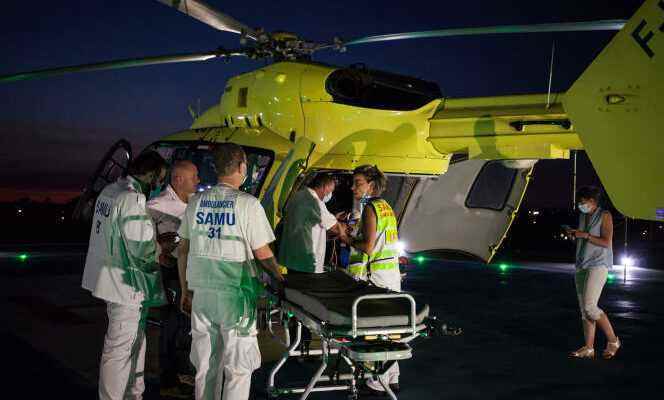Another 38°C posted at the end of the afternoon. The Covid-19 always on the lookout. And the looming national holiday evening, with more than 200,000 people expected in the streets of Toulouse. This July 14, at the SAMU-31 reception and call regulation center (CRRA), in the heart of the Purpan hospital, we expect “to a restless evening”, according to Pierre Roucolle, deputy co-director of the service which receives all calls from the department addressed to 15, the emergency number. “Coupled with the heat wave that is raging on July 14, it is a very hot spot, but we are prepared for it”says the 41-year-old doctor.
On a large plateau lined with computer screens, a dozen medical regulation assistants (ARM), four regulating doctors, a few liberal doctors, externs or interns in medicine take calls. Objective: listen, assess, diagnose, make an emergency medical decision, or not. From bobology, crazy calls, anxiety attacks, but also suspicions of a heart attack, up to drowning or a road accident.
In the basement, four crews are ready to board light vehicles or ambulances. On the roof, two helicopters can take off at any time. In 2021, this center had received 697,000 calls, for approximately 300,000 files processed. That day, around 5:30 p.m., the phone had already rung more than 2,000 times.
Gérard Blanco, the head of the room, oversees the exceptional measures put in place. A provisional emergency system activated at the prefecture coordinates all the responders on the ground. Firefighters, police and SAMU are present in the center of the city with two advanced medical posts. Tents are set up to receive the “passed out, alcoholics, victims of fightssays Mr. Blanco. This makes it possible to reduce ambulance outings and to prepare for any eventuality, such as an attack”he points out.
React quickly and accurately
More insidious than spectacular, the wave of strong heat in July caused damage. Starting with the elderly. Often, the call was relayed by a telecare company connected to a residential facility for dependent elderly people (Ehpad) or to the home of an isolated person. In the elderly, “We don’t disturb the doctor for nothing, it’s generational. And then it’s often the families who call, so most of the time it’s to be taken seriously.”says Gérard Blanco.
Among these people, who live without air conditioning in their homes, or isolated in rural areas, discomfort, or more serious cases, accumulate. On each assistant’s computer, a “Heat wave” folder. In less than five minutes, the diagnosis should be 90% complete. Particular attention is paid to the elderly. “With around 7,500 people in nursing homes in the department, we adapted with the white and blue plans. But we have also set up a hotline seven days a week and we are in constant contact with the SAMU”explains Hélène Villars, geriatrician at the Toulouse University Hospital.
You have 46.29% of this article left to read. The following is for subscribers only.
